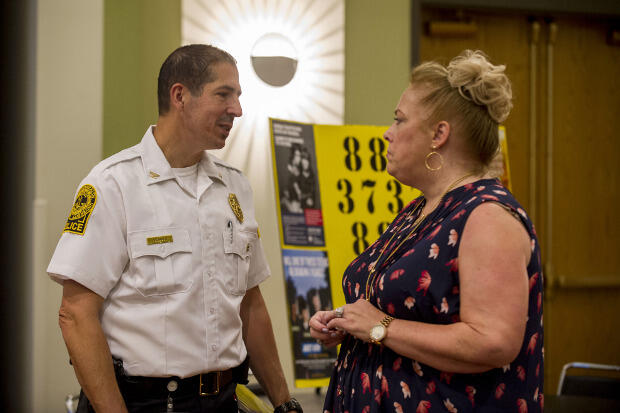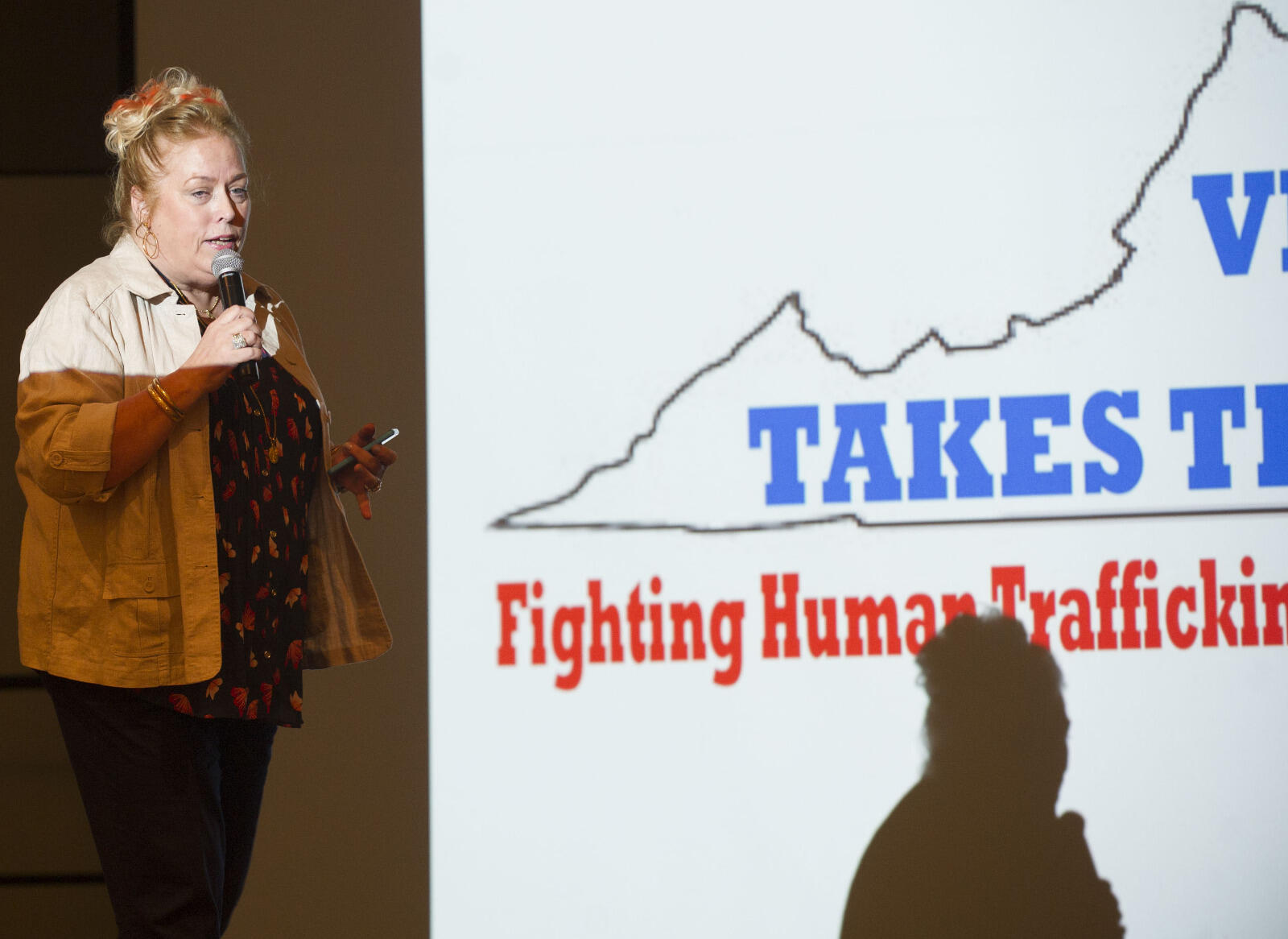
<br>Photos by Julia Rendleman, University Marketing</br>
Aug. 3, 2016
Human trafficking survivor: ‘Richmond has the moral imperative to lead’
Barbara Amaya’s powerful story highlights kickoff event for anti-human trafficking initiative
Share this story
Many Virginians have an outdated notion of human trafficking: Where it takes place, who controls this criminal world and what kind of people become victims. Virginia Takes the Lead, an initiative announced Monday during a summit at Virginia Commonwealth University, aims to put the commonwealth on the cutting edge against human trafficking.
“People say, ‘That’s not happening! That’s not happening on college campuses! That’s not happening here!’” said Barbara Amaya, a survivor and advocate who spent her teenage years under the control of a human trafficker.
In fact, Amaya said, even middle and high school students are drawn in by criminal organizations.
“Richmond has the moral imperative to lead from the front,” Amaya said.
The event, which drew more than 40 people, including a large contingent of VCU Police officers and staff, was sponsored by VCU, IMPACT, the student group Students of Freedom at VCU and the Richmond Human Trafficking Initiative. All regions of Virginia were represented, and staff from the Office of the Attorney General were on hand with information on human trafficking.
Rick Tatnall, community activist and organizer of the Virginia Takes the Lead summit, described the occasion with the Greek word Kairos. Kairos means the right and opportune moment.
“You have to both recognize and seize the opportunity and rush forward. We believe that this is a Kairos moment for the commonwealth,” Tatnall said. “It’s going to create this crescendo of action.”
Years in captivity
Amaya shared her story of how she spent 10 years as a victim of human trafficking — a term she would not learn until years after escaping. The Department of State defines it as “the act of recruiting, harboring, transporting, providing, or obtaining a person for compelled labor or commercial sex acts through the use of force, fraud, or coercion.”
After suffering abuse from her family, and falling through the cracks of the juvenile justice system and social services, Amaya ran away from her Fairfax, Virginia, home at age 12. In Washington, D.C., she was sold to a human trafficker who forced her into the sex trade in New York City.
For 10 years, her trafficker never said her name.
“I had a daily quota. It didn’t matter if I’d been arrested. It didn’t matter if I’d been raped and robbed. When people think they’ve purchased you, they think they can do whatever they want with you,” Amaya said. “You’re not a human being anymore.”
In her early 20s, Amaya turned to a clinic to break her heroin addiction. She had no identification, no Social Security number and was not sure how old she was. There, a counselor went above and beyond to help her reconnect with her family and break free. After escaping, she spent years trying to put her life back together. Then, she lost a job after her fingerprints were tied to criminal records from her time in New York City.
“I was so traumatized and so ashamed because I thought it was my fault,” Amaya said.
I was so traumatized and so ashamed because I thought it was my fault.
One day, a TV news story mentioned the term “human trafficking,” which caught her attention. Learning that she was not alone — and that people were still being preyed upon — compelled her to come out of the shadows and shame to become a vocal advocate.
“I didn’t self-identify as a victim of human trafficking until 2012. Why was that? Because the traffickers’ programming of my young mind was so intense, I believed everything had been my fault and my idea,” she said. That included a fear and hatred of law enforcement.
Today, Amaya travels as an anti-human trafficking advocate and law enforcement trainer and has written a book, “Nobody’s Girl.” She warned parents that social media has moved traffickers from dark alleys and bus stations into your living rooms.
Still, she remains hopeful.
“We’ve made enormous progress since 2000,” she said. “I’m optimistic that we will see the end of human trafficking.”

‘It’s happening right under their eyes’
According to the National Human Trafficking Resource Center, there were 73 cases reported last year in Virginia. Nearly half involved minors.
Laura Lederer, president and founder of the Global Centurion Foundation, ran through a lengthy list of sex trafficking rings busted by federal, state and local authorities in Virginia and the Richmond region. Global Centurion is a non-profit organization that fights human trafficking.
“Each story is different, but each story is very similar,” Lederer said.
Many of the legal cases had common ties, such as girls and boys lured through social media with promises of relationships and money; control through drugs, alcohol and abuse; and gang control of the illegal enterprises. Many are sold for sex through social media and websites, with some criminals even selling sex door-to-door in apartment complexes.
“When you go in and spend that money, you are giving that money to gang members and you’re enriching them — and making them more powerful,” Lederer warned. “We can’t wait for that 911 call. We have to be out there, generating leads and following up leads and engaging with people. This isn’t only happening in the big cities in Virginia, it’s happening in the little cities and rural areas as well.”
Tatnall put it bluntly.
“It’s happening right under their eyes, in plain sight,” he said.
Echoing the post-9/11 anti-terrorism focus, he told Virginians, “if you see something, say something.”
“Human trafficking is an abomination, and modern day slavery is really what we’re talking about,” Tatnall said. “Unfortunately, it’s getting stronger because we’re not paying enough attention to the details.”
Subscribe for free to the weekly VCU News email newsletter at http://newsletter.news.vcu.edu/ and receive a selection of stories, videos, photos, news clips and event listings in your inbox every Thursday.
Subscribe to VCU News
Subscribe to VCU News at newsletter.vcu.edu and receive a selection of stories, videos, photos, news clips and event listings in your inbox.











